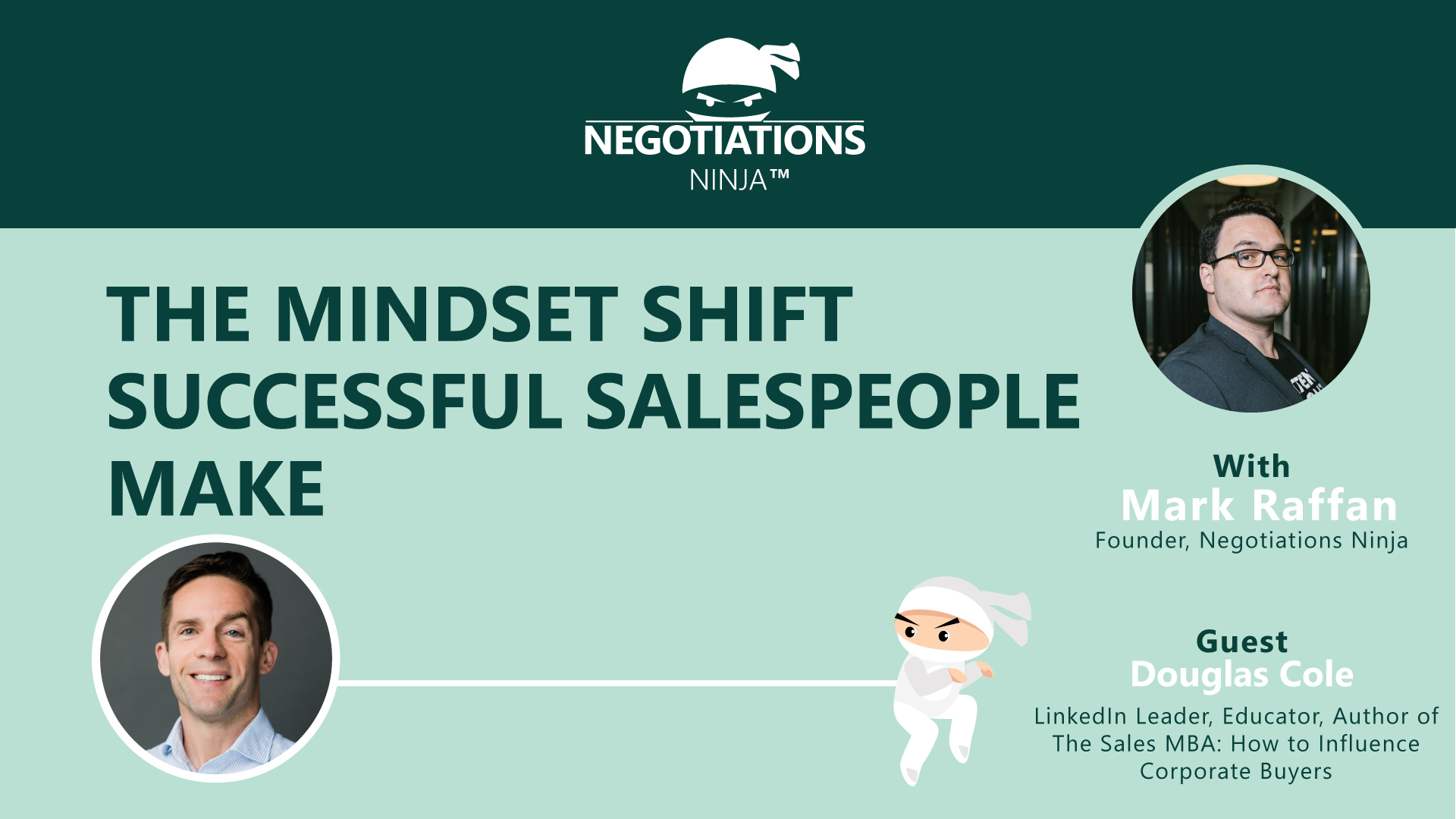What do most sales books get wrong? What levers of influence are necessary to move people in your direction? What is the mindset shift required to move from novice to successful salesperson? These are all things that Douglas Cole covers in his newest book, “The Sales MBA,” and we’re lucky enough to discuss them in this episode of Negotiations Ninja.
Outline of This Episode
- [1:45] Learn more about Douglas Cole
- [2:20] Learn more about Douglas’s book: The Sales MBA
- [5:51] How you can become a change agent
- [8:58] The energy of where change is
- [13:28] Becoming a decision architect
- [16:32] The principle of self-interest
- [19:56] Levers to create influence
- [23:37] Why people forget to leverage unity
The Sales MBA
Douglas found it odd that sales as a study is incredibly underrepresented in post-secondary education. There are 4,000+ university programs, and fewer than 400 of them offer sales programs. The overarching objective of his book is to get to a consensus on education in B2B sales.
Steven Covey once said, “If you want incremental change, focus on behavior. If you want quantum change, focus on the paradigm.” That stuck with Douglas. He’s noticed in his career that there’s an important connection between someone’s importance and their mindset. He’s seen that those who advance have made a significant mindset shift.
The mindset shift successful salespeople make
When first starting a career as a salesperson, most people are usually uncomfortable trying to persuade a stranger to buy something. They try to cover that discomfort by focusing on being likable and charming. As they improve, they gravitate toward mutuality and think in terms of win-win outcomes. They want to engineer a situation that benefits both sides.
Those who find the most success are those who achieve objectivity, meaning they are perceived as being objective by the client. They are viewed as a trusted advisor who can offer a credible opinion on the buyer’s decision.
That’s a difficult mental state to achieve and represents a paradigm shift. In his book, Douglas emphasizes that you have to think of yourself differently. You are not an order taker. You are not reactive. You are a strategist, a change agent, and a decision architect.
Levers to create influence
The book, “Influence: The Psychology of Persuasion,” by Robert Cialdini—which everyone should read, by the way—covers seven levers of influence, and each is incredibly pervasive in everyday life.
To leverage your role as a strategist, change agent, and decision architect, you need to be intimately familiar with each of these levers:
- Social proof: We defer to popular things
- Authority: We are heavily influenced by someone’s credentials
- Consistency: We feel duty-bound to uphold our stated commitments
- Likeability: We are disposed toward people who make us feel special
- Reciprocity: We feel strongly to return anything we perceived as a favor
- Scarcity: We are fearful of losing out on perceived fleeting opportunities
- Unity: We feel a strong identification with people who share our social/cultural identity
We are exposed to these concepts every day in our daily life. They are proven to work. So if you work in the world of persuasion and influence, you need to integrate these into your thinking patterns.
The principle of self-interest
Most people view themselves in a particular way; or aspire to be something. Your focus needs to be on making someone else look good. Allow them to live up to their conception of who they aspire to be.
One of the common challenges a sales professional has in discovery is trying to elicit information from their organization. You need to do it in a way that flips the power dynamic. To do this, you can defer to the senior member as the expert and solicit their advice. In doing so, you appeal to their ego.
It inverts the power dynamic and makes the person interested and eager to offer advice to solve the problem in the interests of both sides.
Listen to the whole episode to learn more about the roles of a strategist, a change agent, and a decision architect.
Resources & People Mentioned
- The Sales MBA: How to Influence Corporate Buyers
- Influence: The Psychology of Persuasion
- Pre-Suasion: A Revolutionary Way to Influence and Persuade
Connect with Douglas Cole
- The Sales MBA
- Subscribe to The Sales MBA newsletter
- Connect on LinkedIn
- Follow on Twitter
Connect With Mark
- Follow Negotiations Ninja on Twitter: @NegotiationPod
- Connect with Mark on LinkedIn
- Follow Negotiations Ninja on LinkedIn
- Connect on Instagram: @NegotiationPod




